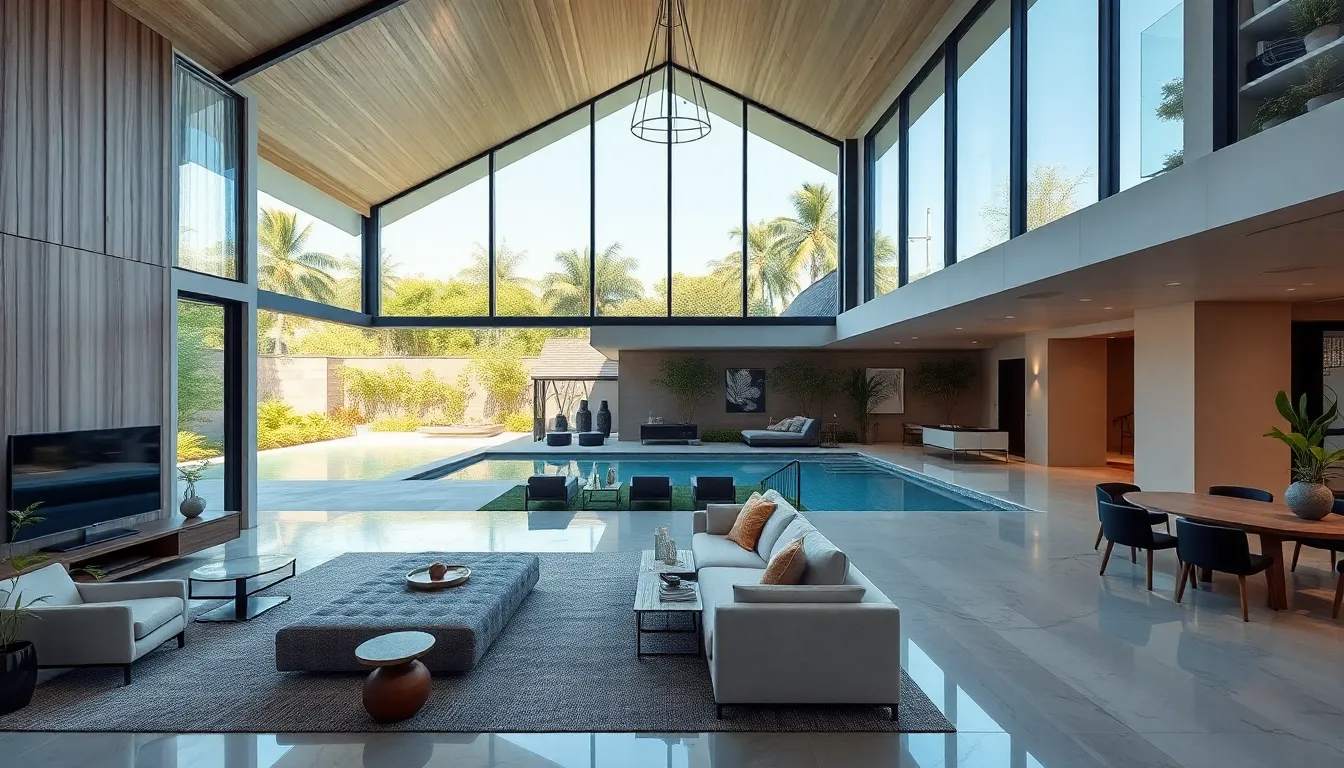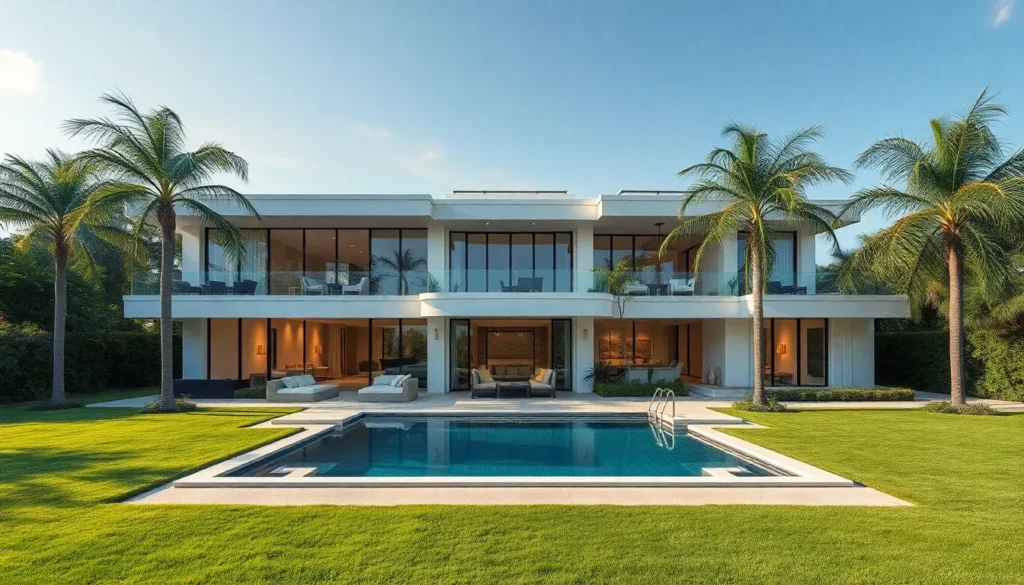Table of Contents
ToggleLuxury real estate represents more than just a home; it’s a lifestyle choice that reflects status, sophistication, and comfort. As the demand for opulent properties continues to rise, buyers are seeking unique features and prime locations that offer both exclusivity and investment potential.
From sprawling mansions in Beverly Hills to chic penthouses in New York City, the luxury market caters to those who appreciate the finer things in life. Understanding the nuances of this sector is crucial for both buyers and sellers navigating the complexities of high-end transactions. With the right insights, one can unlock the secrets to making informed decisions in this competitive landscape.
Overview of Luxury Real Estate
Luxury real estate epitomizes a high-end lifestyle, characterized by exclusivity and sophistication. This segment of the market caters to affluent buyers seeking unique properties that provide not only comfort but also investment value.
Definition of Luxury Real Estate
Luxury real estate refers to high-value properties generally priced at over $1 million. These properties often include extravagant features and prime locations, aligning with the preferences of wealthier clientele. The definition varies globally, as market trends and regional economic conditions influence what constitutes “luxury.”
Characteristics of Luxury Properties
Luxury properties possess distinct characteristics that set them apart:
- Prime Locations: Properties are typically situated in prestigious neighborhoods, near city centers, or by scenic waterfronts.
- High-Quality Materials: Construction involves superior materials such as marble, granite, and hardwood, enhancing durability and aesthetic appeal.
- Unique Architectural Designs: Properties feature innovative designs that often include custom layouts, open spaces, and eco-friendly technologies.
- Luxury Amenities: Homes frequently offer amenities like swimming pools, home theaters, wine cellars, and smart home technology to elevate living experiences.
- Exclusivity and Privacy: Many luxury properties provide gated access and expansive grounds, ensuring privacy and security for owners.
These characteristics combine to create unparalleled living experiences, making luxury real estate highly sought after.
Market Trends in Luxury Real Estate

The luxury real estate market continues to evolve, showing distinct patterns shaped by current economic conditions and consumer preferences. Understanding these trends aids buyers and sellers in navigating this exclusive market.
Current Market Conditions
Current data indicates a robust demand for luxury properties, with sales consistently rising. In the third quarter of 2023, luxury home sales increased by 12% compared to the previous year, primarily in metropolitan areas like New York, Los Angeles, and Miami. High-net-worth individuals seek unique features and amenities, such as expansive outdoor spaces and dedicated home offices, influenced by lifestyle changes post-pandemic. Supply remains limited in prime neighborhoods, driving prices up; average sales prices for luxury homes reached $3.2 million, reflecting a 15% year-on-year increase.
Emerging Trends
Emerging trends highlight several factors reshaping luxury real estate.
- Sustainability: Buyers increasingly prioritize eco-friendly features, such as solar panels and energy-efficient appliances, aligning with sustainability goals.
- Technology Integration: Smart home systems are standard, offering enhanced security and energy management.
- Wellness Amenities: Properties that include wellness features like home gyms, spas, and meditation rooms appeal to health-conscious buyers.
- Remote Work Solutions: Home offices with high-speed internet access and soundproofing gain importance as remote work continues to be prevalent.
- Urban vs. Suburban: A shift towards suburban living occurs as families look for more space while still desiring proximity to urban centers.
Awareness of these current market conditions and emerging trends empowers stakeholders in the luxury real estate sector to make strategic decisions.
Key Players in Luxury Real Estate
Luxury real estate involves various key players who drive the market and shape its dynamics. Understanding their roles is crucial for navigating high-end transactions effectively.
Real Estate Developers
Real estate developers play a vital role in the luxury market by creating high-end properties. They identify lucrative locations, plan projects, and oversee construction. Developers often collaborate with architects and interior designers to ensure properties meet the exclusive standards desired by affluent buyers. Examples of successful luxury developments include high-rise condos in urban centers and sprawling estates in desirable suburbs. Developers’ insights into market trends enable them to incorporate sought-after features such as sustainability and smart technology, enhancing the appeal of their projects.
Real Estate Agents
Real estate agents specializing in luxury properties possess expertise that is critical in this niche market. Agents leverage extensive networks to connect buyers and sellers, utilizing marketing strategies tailored to high-end clientele. They understand the nuances of luxury transactions, from pricing strategies to negotiation tactics, ensuring a smooth process. Agents often highlight properties’ unique features and locations to attract discerning buyers. Success stories of high-profile agents, like those in major cities, showcase their ability to close significant deals while providing exceptional service to their clients. Their market knowledge and client relationships are key to achieving desired outcomes in luxury real estate transactions.
Investment Opportunities in Luxury Real Estate
Investing in luxury real estate presents unique opportunities that can yield significant returns. Understanding the benefits and risks involved plays a crucial role in making informed investment decisions.
Benefits of Investing
- High Appreciation Potential: Luxury properties often experience higher appreciation rates compared to standard real estate. Historical data shows that luxury real estate can appreciate 5-10% yearly in prime locations.
- Tax Advantages: Investors frequently benefit from tax incentives, such as depreciation deductions and the potential for 1031 exchanges, which allow deferring capital gains taxes on investment property sales.
- Rental Income Opportunities: Luxury properties in desirable locations can command premium rental rates. Seasonal and short-term rentals can generate significant income, especially in tourist hotspots.
- Portfolio Diversification: Introducing luxury real estate into an investment portfolio can provide diversification, helping to mitigate risks associated with stock market volatility.
- Prestige and Exclusivity: Owning luxury real estate often enhances an individual’s status and lifestyle, offering a unique living experience in exclusive environments.
Risks Involved
- Market Volatility: Luxury real estate markets can fluctuate significantly due to economic conditions, resulting in potential losses for unaware investors. Awareness of market trends is essential.
- High Acquisition Costs: Initial investments in luxury properties often require substantial capital, making it critical to conduct thorough financial analyses before purchase.
- Maintenance and Upkeep: Luxury homes typically require ongoing maintenance, which can be costly and time-consuming. Investors must budget for regular upkeep to protect their investment.
- Illiquidity Concerns: Selling luxury real estate can take longer than standard properties, presenting liquidity issues. Buyers may need patience, as finding the right buyer can take time.
- High Property Taxes and Insurance: Luxury properties often come with increased property taxes and insurance costs, impacting overall profitability. Investors should factor these expenses into their financial projections.
Navigating the luxury real estate market requires a keen understanding of its unique dynamics and trends. As demand for exclusive properties continues to rise, buyers and sellers must stay informed about market fluctuations and emerging preferences.
Investing in luxury real estate offers not only a prestigious lifestyle but also significant financial opportunities. With the right insights and expert guidance, stakeholders can make strategic decisions that align with their goals.
Embracing sustainability and smart technology will likely shape the future of luxury living, making it essential for participants in this sector to adapt and innovate. The allure of luxury real estate remains strong, promising unparalleled experiences and lasting value.







